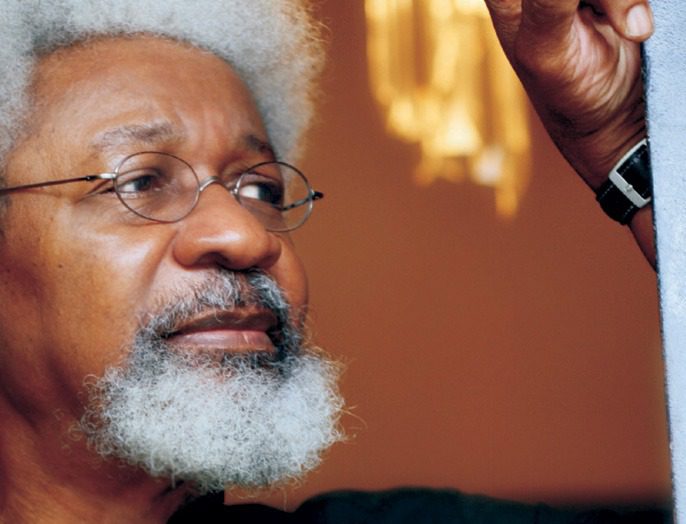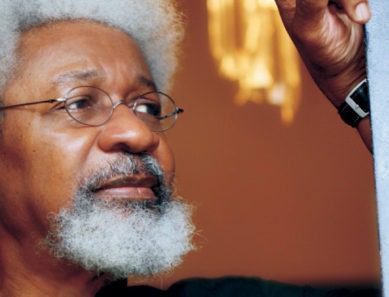National Issues
Soyinka, Jonathan and the Nebuchadnezzar metaphor -By Robert Obioha

The Nobel Laureate and Africa’s foremost dramatist, Professor Wole Soyinka, has added his voice to the ongoing debate on the state of the nation and criticism of President Goodluck Jonathan’s administration by some notable Nigerians. Coming on the heels of earlier bashings by former President Olusegun Obasanjo and their opposition apologists, the most consistent critical voice in national affairs, highly acclaimed wordsmith, literary figure and rights activist, the Kongi has described President Jonathan as being worse than the Babylonian king, Nebuchadnezzar and a leader that embraces impunity.
In the opening of his text entitled: “King Nebuchadnezzar—The Reign of Impunity”, the renowned man of letters, who lampooned America for their refusal to sell arms to Nigeria, broadly explained his deployment of the Nebuchadnezzar metaphor to describe President Jonathan thus: “I shall not insist that the historic/biblical figure of Nebuchadnezzar is uniquely apt for the pivotal figure of the ‘democratic’ history in the making at this moment—for one thing, Nebu was a nation builder and a warrior. One could argue, even more convincingly for the figure of Balthazar, his successor, or indeed, Emperor Nero as reference point—you all remember him—the emperor who took to fiddling while Rome was burning. However, you should easily recall why I opted for King Nebu—the figure that currently sits on the top of our political pile himself evoked it, albeit in a context that virtuously disclaimed any similarities, even tendencies. Perhaps, he meant it at the time when he claimed: ‘I am no Nebuchadnezzar.’ Perhaps, not!”
According to the Nobel Laureate, President Jonathan’s numerous ‘sins’ to merit the Nebuchadnezzar description are legion. They include not in a special order: the Inspector General of Police, Suleiman Abba’s “inaugurating of a season of brutish power” in apparent reference to the recent fracas at the National Assembly where policemen prevented lawmakers from gaining access to the complex, on issues bordering on insecurity, thereby necessitating lawmakers’ jumping of fence; the split in the Nigerian Governors’ Forum and Jonathan’s ‘formal’ recognition of the minority will in a peer election; Jonathan’s choices of the occupancy of crucial public positions—such as the protective arm of the nation; the menace of the Boko Haram; the stopping of an elected representative of a people, a governor, from going about his duties as happened in Ekiti elections; the shambles that punctuated a presidential campaign visit at the Obafemi Awolowo University; the march of a nation towards implosion as characterized by the various bombings of public places and kidnap of Chibok girls; and the premature and unceremonious removal of deceased then Foreign Minister, Gbenga Ashiru, the architect of the initial policy to containment.
Most of the issues raised by Soyinka are valid and worth taking a deeper interest especially the role of the police at the National Assembly fracas, and the increasing menace of the insurgents. Although Soyinka does not praise any Nigerian leader, I do not agree with his deployment of the Nebuchadnezzar metaphor to describe the present occupant of Aso Rock and his justification of lawmakers’ scaling the fence to perform their duties. What the police and the lawmakers did that day was a show of shame that could be avoided.
There is no way Jonathan can be referred to as Nebuchadnezzar or being worse than him. President Jonathan has once said that he is not King Nebuchadnezzar in apparent reference to critics that said that Jonathan has no biceps, liver and what have you. My take on some allegations against Jonathan is that he might not have lived up to some people’s expectations in certain aspects of governance, such is not unexpected anyway, but certainly he is never the Nebuchadnezzar of Soyinka’s portrayal. There are other better characters in the bible that can fit Jonathan’s profile, but Soyinka deliberately ignored them.
Nebuchadnezzar was a boastful king, a demigod that craved for worship, a tyrant that did not listen. Jonathan does not exhibit these qualities. Jonathan’s meekness, listening disposition, not talking much, showing empathy and leading in crisis period would have resembled the character of Moses and not Nebuchadnezzar. Therefore, the deployment of Nebuchadnezzar metaphor by Soyinka to describe President Jonathan is very harsh and inappropriate. Soyinka can still criticize Jonathan without linking him to that wicked character in the bible.
No matter what critics of the current administration have to say, Jonathan is a nation builder as well as a warrior. He has made some modest achievements that the prevailing circumstances could allow him. It takes only a nation builder and a warrior to do what Jonathan is presently doing. But two areas I would like Jonathan to intensify effort are the war against insurgency and corruption. The two problems can kill the country. As for impunity, Jonathan is far from it. Some of his appointees can be but he should caution them. Truly, we know Nigerian rulers that were impunity personified. Jonathan is not one of them.
If President Jonathan had Nebuchadnezzar’s tendencies, the Soyinkas of this world would now be in exile as was his lot during the heydays of Abacha’s reign. If Jonathan were a Nebu, the opposition and the Press would have known it by now. All those criticizing Jonathan would have been cooling off in one detention camp or the other. President Jonathan is the most tolerant leader Nigeria has produced. He is a good listener. He may be slow to action but he would act. His toleration of the opposition and their antics is indeed good for our democracy. If Jonathan were to use one tenth of his powers, the opposition will not be and some Nigerians talking now would have run away. The best way to build democracy is for critics to offer constructive criticisms that can move the nation forward.
Painting our leaders with harsh metaphors cannot take us anywhere, especially those that the metaphor did not fit appropriately. Nigeria’s problem is the inability of its people to form a nation. Most Nigerians do not treat the country as a nation. Their allegiance is more to their tribe or religion. Under the prevailing atmosphere, Nigeria is a victim of a nation searching for its statehood. Until we define Nigeria and a Nigerian, the crisis of nationhood will not leave us.
It is not about President Jonathan or whoever. All the politicians overheating the polity for selfish reasons should save us another journey into darkness. It is no longer hidden that Nigeria is in a war situation and all hands must be on deck to salvage the nation. It is not a Jonathan war, it is a Nigerian war. The earlier this is clear to all Nigerians, the better.


















